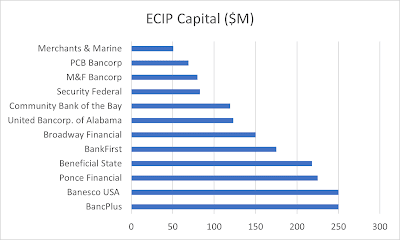Saturday, July 30, 2022
Nano Banc in Calif. adds new CEO, chairman
Friday, July 29, 2022
U.S. Bancorp to pay $37.5M fine over fake accounts
Blue Ridge Bankshares has update on fintech, mortgages
Heritage Commerce in California selects next CEO
Red River Bancshares in La. to open New Orleans branch
Thursday, July 28, 2022
Tech upgrades in works at several community banks
FDIC approves proposed de novo in S. Florida
Customers in Pa. makes progress with digital assets push
How a small Ohio bank pulled in 10 buyout offers
Wednesday, July 27, 2022
Heritage Southeast to sell to First Bancshares in Miss.
Sturgis Bancorp in Mich. names new bank leadership
Grasshopper in NY signs up initial BaaS client
BayFirst adds new SBA product, hires mortgage team
Finward closes two branches, reinvesting in digital
Investar to sell two branches in south Texas
BaaS drives deposit growth at New York Community
Hanover Bancorp to expand onto Long Island
Ford's FDIC application sheds light on ILC plans
Tuesday, July 26, 2022
Trustmark in Miss. pursuing business lines, tech upgrades
NSTS Bancorp in Illinois names new bank CEO
Mark Hoppe to retire as Fifth Third regional president
Genesis Bank in Calif. launches escrow division
Ford applies for industrial loan charter
Bank First to buy Hometown Bancorp in Wisconsin
Somerset Savings to convert, buy Regal Bancorp
Monday, July 25, 2022
NBT Bancorp to buy insurance agency in northwestern NY
A look at which banks have received ECIP funds
Several banking companies have disclosed the receipt of capital from the Treasury Department's Emergency Capital Investment Program (ECIP).
The Treasury invested nearly $1.8 billion between late April and late July, according to data compiled by Performance Trust Capital Partners. The banks are issuing preferred stock in exchange for the fresh capital.
Security Federal in Aiken, S.C.; BancPlus in Ridgeland, Miss.; Broadway Financial in Los Angeles; and Ponce Financial Group in Bronx, N.Y., are among the companies that issued releases about their ECIP funding.
This chart includes more banking companies that have benefited from the program.
The Treasury set aside $8.7 billion to invest in Community Development Financial Institutions (CDFIs) and Minority Depository Institutions (MDIs) through the ECIP.
The capital will help those institutions provide loans, grants and forbearance for small and minority-owned businesses, as well as consumers in low-income and underserved communities.
Alpine Banks of Colo. raises $34M in private placement
National Bank in Denver invests in B2B payments firm
Citizens becomes official bank of NFL's Giants
MainStreet in Va. plans to debut BaaS product in 4Q
HomeTrust in NC to enter Atlanta with Quantum deal
Sunday, July 24, 2022
Trustar in Va. raises capital with expansion in mind
Friday, July 22, 2022
Customers to close five branches in Pennsylvania
How F.N.B. landed a deal for NC bank
Thursday, July 21, 2022
Home in Ark. saw 'mini mutiny' of Happy State employees
Patriot National, American Challenger call off merger
Vermont de novo receives conditional FDIC approval
Amerant boosted stake in mortgage company in 2Q
Live Oak adds mortgage company CEO to its board
Wednesday, July 20, 2022
Citizens State parent to buy First Savanna in Illinois
Signature in NY to tap brakes on CRE lending
BMO to buy environmental strategies firm
Business First to raise $47M through stock offering
Business First Bancshares in Baton Rouge, La., plans to raise about $46.8 million from selling common stock. The $5.5 billion-asset company...
-
Bank of the Lowcountry in Walterboro, S.C., has a new CEO. The $269 million-asset bank said in a LinkedIn post on Friday that it had hired...
-
First Missouri Bank in Brookfield has a new name. The $377 million-asset bank has rebranded as Verimore Bank in a move that deemphasizes lo...
-
MainStreet Bankshares in Fairfax, Va., is in the process of bringing on its first Banking-as-a-Service customer. The $1.8 billion-asset co...

